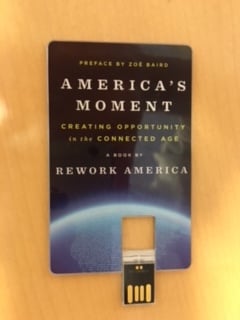You have /5 articles left.
Sign up for a free account or log in.
 Earlier this year I attended a talk on campus given by Philip Zelikow, lead author of the excellent book America's Moment: Creating Opportunity in the Connected Age. What was unusual about the talk was not the terrific speaker, fascinating topic, or engaging discussion. (That happens all the time on my campus).
Earlier this year I attended a talk on campus given by Philip Zelikow, lead author of the excellent book America's Moment: Creating Opportunity in the Connected Age. What was unusual about the talk was not the terrific speaker, fascinating topic, or engaging discussion. (That happens all the time on my campus).
What was different is that all of us attending the talk, and there were over 100 of us, were all handed a small plastic card (credit card size) with an attached mini usb drive. The USB drive contained both an excerpt and a video about the book.
This was a method for distributing digital content that I had never seen. Apparently, a business card flash drive is not all that unusual. You can order a pack of 50 (with 2GB) from Amazon for $169.99.
Alas, the flash drive did not contain the full digital book. If you wanted to read the e-book or audiobook version of America’s Moment then you need to buy it from your preferred digital/audio book seller. The lack of the full digital book on the business card flash drive seemed - to me at least - a wasted opportunity.
America’s Moment was underwritten by the Markle Foundation. The book, despite being written in collaboration with a large cast of experts, is an excellent read. In a short review for The Atlantic, James Fallows wrote that America’s Moment is a "clear-headed, economically sophisticated, historically grounded, vividly argued guide to the next stage of American growth.” I fully agree, and would add that America’s Moment is highly relevant to higher education, as the book makes strong arguments for how our postsecondary educational institutions must change in an era of ubiquitous information, fast encroaching automation, and a labor market that has largely eschewed long-term career paths or employment security.
I had read the book before going to the talk - but I bet that many in attendance would have read (or listened) to the entire book had it been contained on the flash drive credit card.
In an attention economy, the ability to get your message by combining the best attributes of physical and digital goods may be compelling.
The practice of handing out paper books, particularly books like American’s Moment that are both underwritten and have a thought leadership agenda, is well-known and widespread.
The thing is that I don’t want to be handed a paper book. I am now highly selective of what paper books that I bring home. Most of my book reading is done through my ears. Audiobooks let me read while doing other things - such as walking, driving, cooking, cleaning, and doing the laundry. Multitasking reading is the only way I get most of my reading done.
America’s Moment was actually a book that I read on my Kindle, as there is (distressingly) no audiobook available.
My guess is that in the future we will see more full (digital / audio books handed out on business cards. The business cards will become screens and players in themselves, able to display the e-text and play the audiobooks.
The cost for the physical device to deliver the digital content will come down so far that it will make up only a tiny portion of the total cost of the information package. The real costs will be in the production (or licensing) of the digital content contained in the physical delivery device.
The Playaway all-in-one audiobook is a step towards this future. Today, Playaway books are expensive (over $30) - but that those prices are bound to fall rapidly as the costs of the underlying technologies continue to drop.
The future will hold new combinations of cheap (to the point of costless) single use devices paired with digital content.
Will digital educational content be part of this story? Can you foresee learning content, formative and summative assessment distributed through a disposable physical device?
What combinations of low/no cost devices and expensive/valuable digital content can you imagine?




